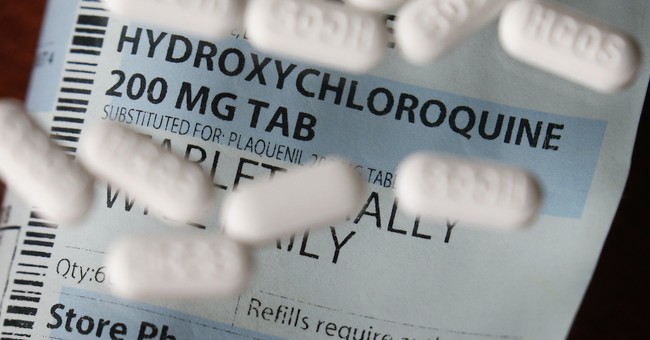Thousands of Doctors: Yes, Hydroxychloroquine Works Against Wuhan Coronavirus
Katie Pavlich
Townhall

Source: AP Photo/John Locher
Over the past three weeks, there’s been debate over whether hydroxychloroquine, a drug used for decades to treat malaria, can help ease the symptoms of Wuhan coronavirus. During White House press briefings, reporters have done their best to shoot down the possibility.
But doctors around the country and the world are using it and seeing positive results.
First, in Los Angeles:
Dr. Anthony Cardillo said he has seen very promising results when prescribing hydroxychloroquine in combination with zinc for the most severely-ill COVID-19 patients.
“Every patient I’ve prescribed it to has been very, very ill and within 8 to 12 hours, they were basically symptom-free,” Cardillo told Eyewitness News. “So clinically I am seeing a resolution.”
Cardillo is the CEO of Mend Urgent Care, which has locations in Sherman Oaks, Van Nuys and Burbank.
He said he has found it only works if combined with zinc. The drug, he said, opens a channel for the zinc to enter the cell and block virus replication.
“We have to be cautious and mindful that we don’t prescribe it for patients who have COVID who are well,” Cardillo said. “It should be reserved for people who are really sick, in the hospital or at home very sick, who need that medication. Otherwise we’re going to blow through our supply for patients that take it regularly for other disease processes.”
Dr. Mohammud Alam, an infectious disease specialist affiliated with Plainview Hospital, said 81 percent of infected covid patients he treated at three Long Island nursing homes recovered from the contagion.
“In this crisis, I realized I had to do something,” Alam said. ”I realized if this was my dad, what would I do? And I would do anything I could to help.”
Alam said he decided he could not apply the touted combination of the antimalarial hydroxychloroquine and antibiotic azithromycin because the side effects could be potentially fatal for his high-risk patients, many of whom had underlying heart issues.
So instead, Alam replaced azithromycin with another decades-old antibiotic that doesn’t pose any known risks to the heart.
Dr. Stephen Smith, founder of The Smith Center for Infectious Diseases and Urban Health, said on “The Ingraham Angle” on Wednesday night that he is optimistic about the use of antimalarial medications and antibiotics to treat COVID-19 patients, calling it “a game-changer.”
Smith, who is treating 72 COVID-19 patients, said that he has been treating “everybody with hydroxychloroquine and azithromycin [an antibiotic]. We’ve been doing so for a while.”
He pointed out that not a single COVID-19 patient of his that has been on the hydroxychloroquine and azithromycin regimen for five days or more has had to be intubated.
An international poll of thousands of doctors rated the Trump-touted anti-malaria drug hydroxychloroquine the best treatment for the novel coronavirus.
Of the 6,227 physicians surveyed in 30 countries, 37 percent rated hydroxychloroquine the “most effective therapy” for combating the potentially deadly illness, according to the results released Thursday.
The survey, conducted by the global health care polling company Sermo, also found that 23 percent of medical professionals had prescribed the drug in the US — far less than other countries.
“Outside the US, hydroxychloroquine was equally used for diagnosed patients with mild to severe symptoms whereas in the US it was most commonly used for high risk diagnosed patients,” the survey found.
The medicine was most widely used in Spain, where 72 percent of physicians said they had prescribed it.
It’s working, which is why President Trump is touting its use.
